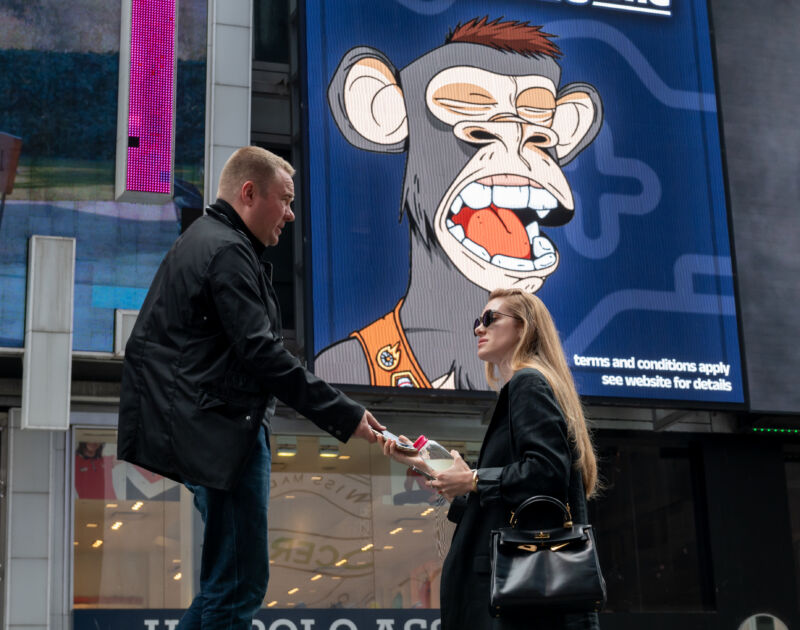
Lamps emitting ultraviolet light in the corner of a Bored Ape NFT event in Hong Kong last Saturday are the likely cause of severe eye and skin injuries among attendees, according to Yuga Labs, the creator of Bored Ape Yacht Club (BAYC) and host of the event.
The injuries reportedly occurred during “ApeFest,” a three-day annual meet-up of people who own Bored Ape NFTs—which sell for tens of thousands of dollars and, amid the 2021 NFT craze, saw highly inflated prices of hundreds of thousands of dollars. However regretful, owners of the cryptocurrency-backed, digital images of nonchalant cartoon primates are automatic members of the BAYC. This year, their annual club event ran from November 3–5 and promised “mayhem” and “One big night full of surprises.”
Soon after an ApeFest party Saturday night, some attendees reported severe pain and burning sensations in their eyes, as well as vision problems and skin irritation, according to Yuga Labs. Doctors and others on the Internet quickly speculated that the cause was UV exposure and photokeratitis (aka snow blindness, arc eye, or welder’s flash), which is akin to a sunburn on the cornea (the clear tissue covering the front of your eye) due to exposure to UV light. The New York Times reported as of Tuesday that the number of attendees injured was over 20.
In a post on X late Wednesday, Yuga Labs confirmed that UV exposure was “likely the cause” of the reports. “These reports were—and continue to be—deeply concerning to us. We immediately reached out to impacted attendees to learn of their symptoms and to direct our investigation,” the firm said.
Yuga carried out the investigation with Jack Morton Worldwide, the event agency that produced this year’s ApeFest. Together, they “determined that UV-A emitting lights installed in one corner of the event was likely the cause of the reported issues related to attendees’ eyes and skin.”
While photokeratitis can be extremely painful and lead to altered vision, the condition typically resolves in hours to days. Long-term eye exposure to UV light can add up to later harm, though, much like it can for skin exposure. For eyes, long-term UV exposure can increase the risk of cancers, cataracts, macular degeneration, and fat deposits or growths on the whites of the eyes (pinguecula and pterygium, respectively.)
This year’s ApeFest is far from the only event at which attendees have been exposed to eye-damaging UV lights. In 2015, four children in Turkey developed photokeratitis after watching the same school theater performance, which included a light show that aimed lights directly at kids in the audience. In 2016, eye doctors in the UK reported a “mass photokeratitis” event in which 22 people developed the condition after UV light exposure at a nightclub. In 2020, health officials in India reported that 284 people developed photokeratitis after attending a “light music event,” at which a metal halide light with a broken outer bulb envelope was found.
Yuga encouraged any injured attendees to seek medical attention and directly contact the company. “We are saddened that this incident has detracted from the experience of ApeFest attendees. Along with Jack Morton, we are committed to supporting the recovery of anyone affected,” the firm wrote.

